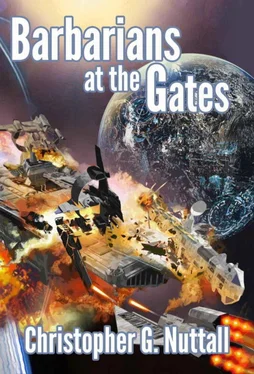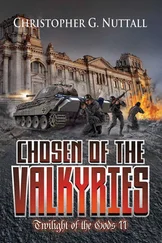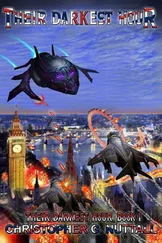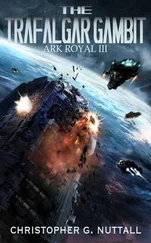On the other hand, the Federation had had space to trade for time. Admiral Justinian didn’t have many stars he could trade for time, not now.
He suddenly looked up at her. “I will command the fleet, of course,” he said.
At her concerned look, he added, “It’s necessary. My men need to know I’ll die beside them, if need be.”
She nodded.
“I’ll let my wife know,” he told her. “Then we can depart on the Rampant Lion .”
Caitlin nodded, feeling a second flicker of sympathy. His wife had had dreams of being Empress since the day she’d been old enough to take part in High Society’s endless rounds of social backstabbing, character assassination and metaphorical bloodbaths. The Court she’d set up on Harmony had always amused Caitlin, even though she knew that Millicent Beauregard-Justinian took it far too seriously. The woman wouldn’t respond well to hearing that she would either have to flee, or be executed by the Senate.
“Yes, sir,” she said. “I expected no less of you.”
* * *
Through heroic effort, the main body of the fleet was brought back into the Jefferson System, just in time to hear that another star system had been taken by the advancing Federation Navy. Admiral Justinian waited long enough to make certain of his supplies, and then led the fleet through the Asimov Point and up the Sphinx Chain. If they were lucky, they would intercept the enemy fleet well short of Lombardi and Harmony.
Caitlin tried to convince herself that they were bound to succeed—the last time the Federation Navy had tried to reach Jefferson, they’d been smashed—but no amount of mental argument convinced her that their success was guaranteed.
* * *
Marius watched as tumbling wreckage drifted past his fleet, the remains of a pair of fortresses that had tried to bar the fleet’s passage to Jefferson. Admiral Justinian had left the outdated fortresses in position and all they had been able to do, despite the advance warning of his coming, was die bravely. They hadn’t even surrendered, although he was fairly sure that they’d been damaged and destroyed before their commanders had realized just how badly the odds were stacked against them.
“All ships report that they’re secure, sir,” Raistlin reported. “The Marine unit dispatched to the planet has reported that the planet has surrendered and is awaiting occupation.”
“There’s no time,” Marius said firmly. “Order them to destroy the planet’s defenses, and then return to the fleet.”
He ignored Williams’ surprised look. The political commissioner had been determined to occupy all the worlds the fleet passed as it advanced up the chain, and Marius had been happy to oblige, but they’d run out of Internal Security troopers to detach from the fleet. Besides, the further they advanced up the chain, the greater the chance they would run into something hard enough to stop them, and he needed all of his destroyers with the fleet.
He keyed his console as he checked the reports from his officers. The battle hadn’t been very costly, at least in men and starships, although he was sure that the bean-counters at the Admiralty would complain about the number of assault pods he’d wasted on the outdated fortresses. Marius found it hard to care. Assault pods could be turned out easily by industrial nodes, but starships and trained crewmen took longer to produce. There was no point in spending lives like water when there was an alternative.
Sixteen starfighters, two destroyers and one heavy cruiser had been blown to atoms in the brief and furious battle. A handful of other ships were slightly damaged. They could carry out their repairs underway.
“The fleet is to resume its course toward the Lombardi Asimov Point,” he ordered. “We will reunite with the Marines and assault cruisers before we charge into the next system. Deploy scout gunboats to cover our flanks and don’t hesitate to launch sensor probes if you think you have a ghost of a target.”
He smiled as he cut the channel. The last system had seemed undefended until a handful of destroyers had appeared from cloak and cut into a pair of his ammunition freighters. It wasn’t a bad tactic if the enemy merely wanted to slow down his advance, as he’d been forced to redeploy some of his destroyers and escort carriers to protect the freighters. The farther they advanced up the chain, the more firepower the enemy would be able to hide under cloak until the time was right.
Magnificent shivered slightly as her main drive went to full power. “The captain’s compliments, sir,” Raistlin reported, “and he wishes to report that we will be at the Asimov Point within twelve hours.”
Marius had to grin at the formality.
“Tell him and his bridge crew to get some rest,” he ordered. “The remainder of the fleet can stand down to condition-two unless the enemy shows his face.”
He’d need some rest himself, although he knew that he wouldn’t sleep well, even in Tiffany’s arms. Bringing her along was in some ways a breach of regulations, and he’d thought long and hard about it as it also risked exposing her to enemy fire. But she’d pointed out that he’d let her go into the Bester System without a second thought, and won the argument.
He turned back to the display, silently counting down the hours until the moment they encountered the enemy fleet. There were just too many unknowns; what had seemed like an excellent—indeed, brilliant—plan when he’d drawn it up in the privacy of his own head now seemed like an act of madness.
Where was Admiral Justinian’s battle fleet? If he’d kept it at Jefferson, the Grand Fleet would have encountered it by now, but they’d seen nothing apart from a handful of light squadrons.
And where was the admiral? It was too much to hope that he’d scattered his fleet all over his little empire, but had he been taken in by the deceptions? Or had he simply not seen the false intelligence at all? Had Marius overestimated his intelligence apparatus on Earth?
“You seem concerned, admiral,” Williams said. “Is the enemy not dancing to your tune?”
The political commissioner had come up behind him, moving silently across the deck. Marius would have been impressed under other circumstances.
“The enemy will do whatever he can to frustrate me, as I will do whatever I can to frustrate him,” Marius quoted from a book of Navy proverbs. “That’s why he’s called the enemy.”
He shrugged. “How much, commissioner, does the enemy know about us?”
“I thought you fed him your fake plan, hook, line and sinker,” Williams protested. “You told me he was fooled.”
Marius shrugged again. He’d exaggerated a little to keep the Commissioner happy, or at least quiet. “The enemy now knows that we are on our way, hammering our way up the chain towards Jefferson,” he said.
He grinned at the commissioner’s sallow face.
“He has to know, because they had plenty of time to get a message out,” Marius explained. “But…does he know our strength? We’ve kept parts of the fleet under cloak, or used ECM to exaggerate our strength…how much does he know? Does he think that we only have fifty superdreadnaughts, or did one of his skippers have the guts to slip close enough to peer though the ECM?”
“I thought you could always detect a ship under cloak if it came close enough to read the letters on the hull,” Williams said.
Marius sighed, concealing his irritation. Whatever criteria the Senate had used when it came to selecting commissioners, it hadn’t included any military background, let alone experience.
“Or are our sensors worse than you suggested?” Williams pushed.
“The enemy may have left a ship in our path, lying doggo,” Marius said. “Risky, very risky; if we detected the ship, we could pop off a single missile and vaporize her. On the other hand, very little chance of detection unless we used full-power active sensors. And her passive sensors would be enough to give them an accurate count of our ships.”
Читать дальше












